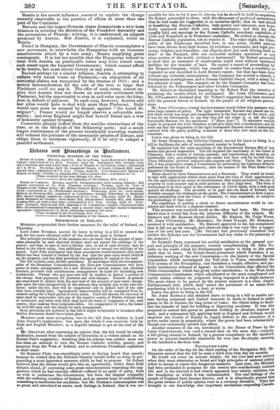Russia is the covert influence assumed to explain the change
recently observable in the position of affairs in more than one part of the Continent. Bavaria and the larger German states demonstrate a new-born firmness in resisting the dictation of the Frankfort Assembly and the pretensions of Prussia ;- relying:, it is understood, on support promised by Austria. But Austria, it is explained, relies on Russia.
Foiled in Hungary, the Government of Olmiitz contemplates a new movement, to overwhelm the Hungarian with an immense simultaneous attack by a vast army; Russia supplying great contingents. It is but too possible that the Hungarian refusal to treat with Austria on practicable terms may have forced some such resort upon the Imperial Government; which cannot afford to be beaten, but must secure victory at any price.
Backed perhaps by a similar reliance, Austria is attempting to enforce very harsh terms on Piedmont,—an abnegation of all territorial claims not recognized by the treaties of 1815; and a money indemnification for the cost of the war, so huge that Piedmont could not pay it. The offer of such terms almost im- plies that Austria does not desire an amicable settlement with Piedmont, but the opportunity to step in and seize upon the king- dom in default of payment. In such case, however, Austria and her allies would have to deal with more than Piedmont. Italy would once more be aroused by despair against "the hated fo- reigner"; France would no longer observe a colourable neu- trality; and even England might find herself forced into a war of humanity against tyranny,.
Commerce already suffers from the warlike obstructions of the time, as in the blockade of the Schleswig ports ; and a much longer continuance of the present vexatiously wavering councils will exhaust the patience of the mercantile peoples of Europe, and oblige them to interpose vigorously, if it be only to compel a peaceful settlement.


























 Previous page
Previous page